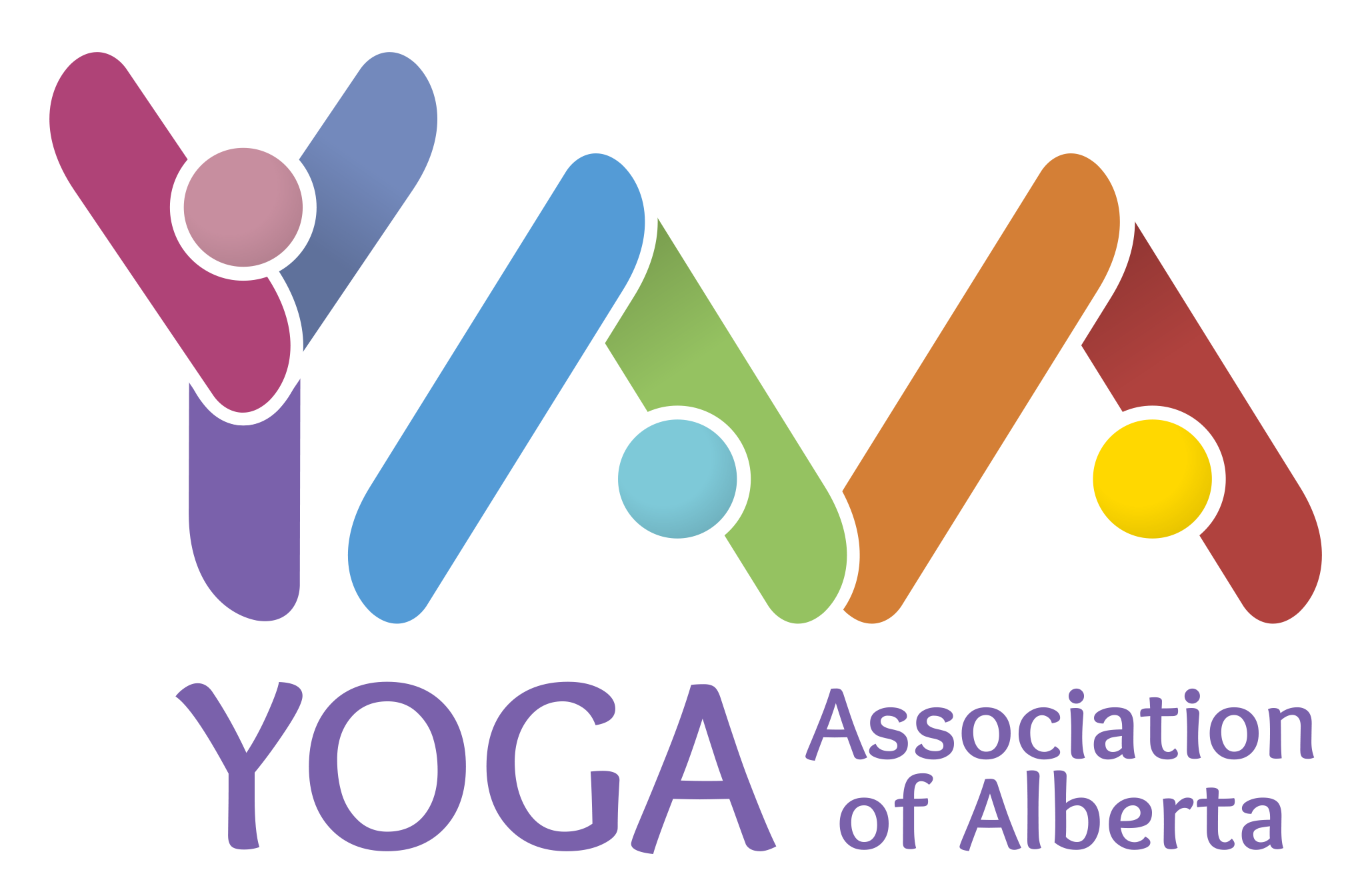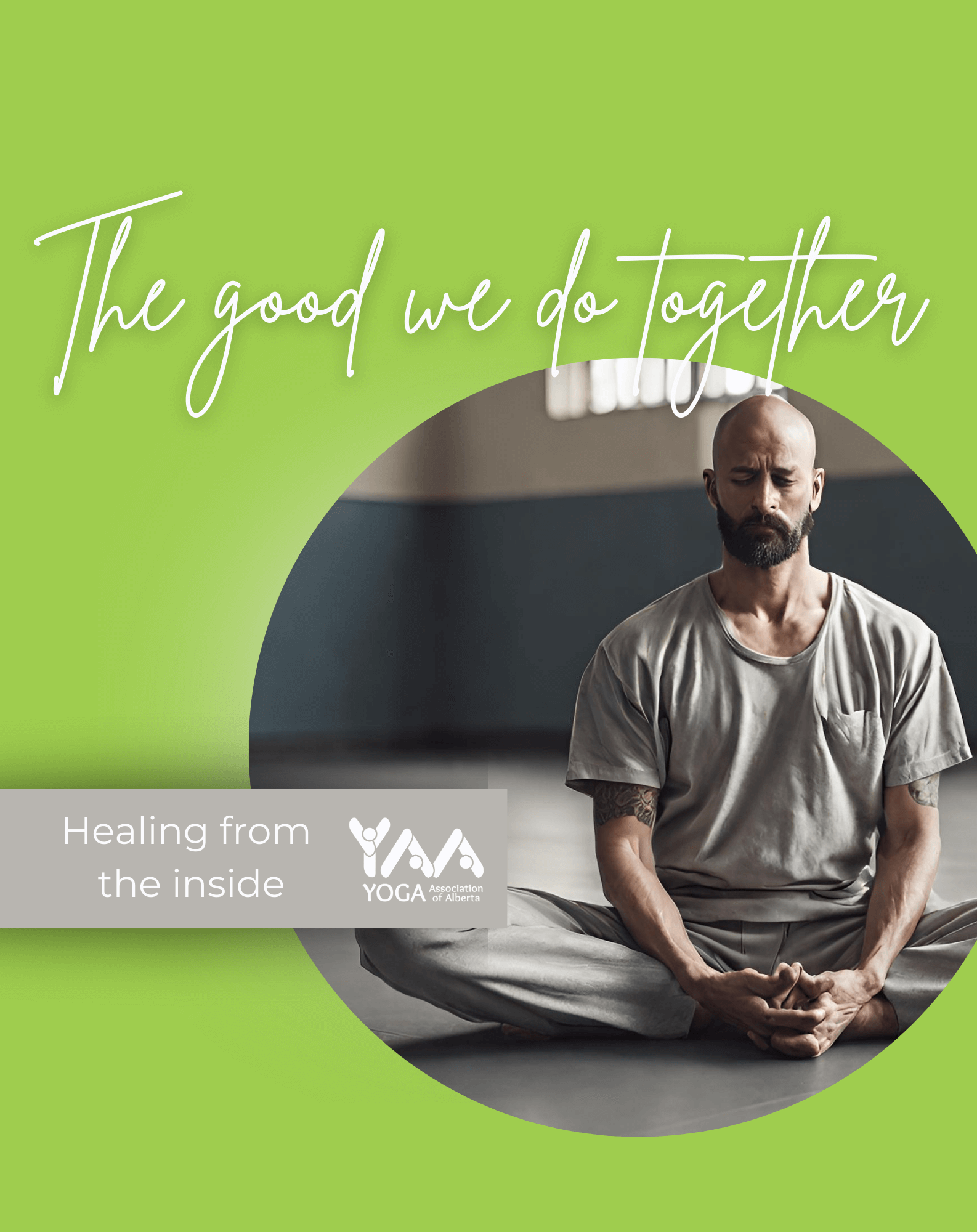by Donalee Campbell, Executive Director
Originally published in Yoga Bridge - WINTER 2025 VOLUME 25 ISSUE 1
The YAA’s vision is to enable everyone to experience well-being, wholeness and community through yoga. Not everyone has equal opportunity to access the healing power of yoga. The YAA’s commitment to inclusivity and accessibility is at the heart of its mission to support equitable access for all Albertans, especially marginalized and under-served communities.
Since 1976, the YAA has been reaching out to various groups including low-income families, seniors, indigenous communities and newcomers across Alberta, offering yoga as a pathway to foster healing, peace, and empowerment. The yoga programs that the YAA runs in correctional facilities are a natural and powerful extension of this work, addressing the unique needs of some of the most vulnerable populations in the province, and serving in some of the most challenging and high-stress environments.
This initiative is especially vital for historically marginalized populations, who not only face systemic disadvantages but may also carry the heavy burden of unhealed personal and generational trauma. Incarceration compounds their pain, trapping them in high-stress environments, perpetuating cycles of stress, anxiety, and reactivity. The relentless pressures of confinement, layered with the weight of unresolved trauma, can make their struggles feel overwhelming and insurmountable.
Healing Through Trauma-Informed Yoga
The YAA’s trauma-informed yoga programs offer support and tools to manage stress, process trauma, and reconnect with inner strength. Participants are given a rare opportunity to let down their guard, explore their thoughts and feelings in a safe space, and reclaim a sense of calm control over their lives.
The YAA’s outreach programs create space for transformative experiences, offering the potential of healing over time. In environments where healing seems impossible, yoga opens a door to hope, giving those in the harshest settings a chance to connect with spirit, build self-worth, and begin a journey of transformation.
A Trauma-Sensitive Approach
A new emphasis in these programs is on trauma-sensitivity, offering trauma-informed yoga as a critical intervention. Trauma-informed practices respect personal boundaries and help individuals regain a sense of agency – the feeling of control over their own actions and decisions—creating a safe space where they can reconnect with their bodies and minds, often for the first time since their trauma. This compassionate approach provides inmates with invaluable skills like self-awareness, mindfulness, emotional regulation and stress management—coping tools essential in the high-stress environment of correctional facilities.
For inmates, many of whom are disproportionately affected by adverse childhood experiences (ACEs) such as abuse, neglect, and exposure to violence, unaddressed trauma often manifests as anxiety, depression, PTSD, and emotional dysregulation. Indigenous and other marginalized communities are particularly affected, with 15 to 20 percent of the Indigenous prison population in Canada having attended residential schools. Traditional rehabilitation methods may not address these deep-seated issues, making trauma-informed yoga a valuable pathway to self-awareness, emotional stability, and constructive decision-making, which can reduce recidivism and foster resilience.
Yoga as a Path to Rehabilitation
Yoga’s benefits extend far beyond physical health. It provides a pathway to emotional and psychological healing that is uniquely suited to the challenges faced by incarcerated individuals. Yoga teaches values such as non-violence, self-compassion, and respect, all of which are essential for individuals seeking to rebuild their lives. Moreover, yoga fosters mindfulness and emotional regulation, helping participants develop skills needed to reduce reactive behavior and make thoughtful decisions in the future.
One of the most profound aspects of trauma-informed yoga is how it creates a safe space for vulnerability, even in environments where vulnerability is often seen as weakness. In a prison setting, where inmates must constantly guard themselves and appear “tough,” yoga offers a rare opportunity to let down those defenses. YAA facilitator Dianne Hucal recalls seeing this shift firsthand: “The men often come in tough, but as the class progresses, they soften. They feel safe enough to show their softer side, and I’ve seen trust and a sense of community grow among them.” This sense of community is vital for individuals who are often isolated and lonely, providing a much-needed space for connection and emotional expression.
Yoga can also play a significant role in rehabilitation by giving inmates tools they can use not only while incarcerated but also once they are released. Yoga teaches principles of self-awareness and self-control that can help individuals break cycles of reactive and destructive behavior. These skills, combined with the mindfulness practices learned through yoga, can help reduce recidivism and offer a new way forward for individuals who might otherwise return to old patterns. For a personal account, see Alistair Middleton’s article, on page 10 of this issue.
Expanding the Reach of Trauma-Informed Yoga
The YAA has a long history of offering outreach programs at correctional facilities throughout Alberta, with programs in Edmonton, Red Deer, Bowden, Drumheller and Calgary. The YAA’s outreach program at the Edmonton Remand Centre (ERC) has been running since 2015, earning high praise from participants and highlighting its positive impact on their well-being. In recent surveys, all respondents reported enjoying the classes, and almost all expressed a desire for more sessions. Participants in the ERC program shared how the practice helps them improve their physical health while also making significant mental and emotional shifts. One inmate expressed, “If I had done yoga before I went to jail, I probably wouldn’t have ended up here.” Another reflected, “I felt peace, which you don’t get to feel a lot in here.” Many have experienced feelings that they expressed in terms including “calm”, “light”, “relaxed”, “happy”, “loved”, “free” and “more connected to Spirit”. These testimonials reveal the power of trauma-informed yoga in helping individuals cope with the immense pressures of incarceration.
The success of the trauma-informed yoga program at the ERC has led to increased demand for more classes, along with requests for similar programs in other correctional facilities. Class size is limited at the ERC for security reasons, and turnover is high, so frequent classes are needed to reach more inmates on a more consistent basis. There have also been requests from other institutions to facilitate classes for women and youth, two groups that face significant trauma and have limited opportunities for healing. Expanding the program to reach these populations is a crucial next step in YAA’s mission to bring healing and empowerment to vulnerable groups.
In response to this growing demand, the YAA is actively building capacity to offer more trauma-informed yoga programs. Since 2022, 74 Certified Yoga Teachers have completed trauma-informed training workshops through the YAA, and many more attended one-hour webinars led by professionals experienced in trauma work. This training equips facilitators with specialized skills to support vulnerable populations, ensuring they can offer safe, effective, and compassionate guidance. More trauma-informed workshops and webinars are planned, including an upcoming webinar on Indigenous cultural sensitivity, which will enhance the facilitators’ ability to engage respectfully with Indigenous cultures and provide a safe space for healing trauma.
How You Can Help: A Call to Action
The success of YAA’s trauma-informed yoga programs relies on the generosity of donors like you. With grant funding becoming increasingly scarce and competitive, your tax-deductible donations are more essential than ever. Continuing and expanding these programs to reach more inmates in response to demand requires funding for trained facilitators, program materials, and tools to measure impact. Your generosity allows us to reach more participants, offer additional classes, and continue providing long-term support, including free memberships and ongoing access to yoga resources after release.
In addition to donations, growing the YAA’s membership base is crucial to sustaining and expanding these programs. By increasing membership, we strengthen our collective voice, which allows us to better advocate for grant funding. Membership supports the YAA’s outreach efforts and builds a community of people dedicated to inclusivity, healing, and empowerment through yoga. Encourage your friends, family, students and colleagues to join—the first year is free for all Alberta residents, and every new member makes a difference.
Every contribution counts. Together, we can make a lasting difference in the lives of those who need it most. Please consider donating or signing up for a membership today to help bring the healing power of yoga through YAA outreach programs such as these.
Why Your Support Matters
Research shows that trauma-informed yoga programs can significantly reduce stress, anxiety, and PTSD symptoms in participants. Inmates who participate in yoga are more likely to engage in positive behaviors and make healthier choices, both during incarceration and after release. By supporting the YAA’s outreach programs, you give individuals a chance to break the cycle of trauma and incarceration, offering hope for a better future.
Together, we can bring healing, resilience, and transformation directly to the people and places where it’s urgently needed, making yoga accessible to vulnerable communities and offering a lifeline of support. Thank you for being a part of this life-changing initiative.

